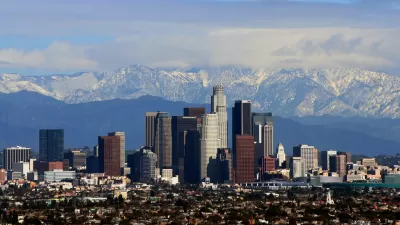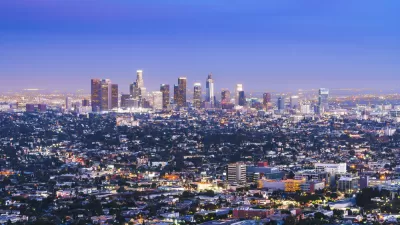The Los Angeles 2020 Commission released a report that presents a scathing portrayal of Los Angeles, including a section on the city’s broken planning process.
The Los Angeles 2020 Commission, appointed by City Council President Herb Wesson and populated by 13 citizens of high standing in business and policy, has released a report called "A Time for Truth."
David Zahniser reports that the report "[offers] a harsh assessment of civic decision-making, warning that Los Angeles is heading to a future where local government can no longer afford to provide public services" and "lacks a coherent approach to economic development and trails other major cities in job growth."
The report examines several land use and infrastructure cases, including investments at the Port of Los Angeles, Los Angeles International Airport, and a $1 billion development plan sought by the University of Southern California. The report calls the years it took to approve that proposal "Not a sensible way to treat the city's largest private employer."
The report also devotes a section to discussion of the city’s outdated community plans and 1940s zoning code: "As a consequence of poor planning and outdated zoning, almost all projects have to go to City Hall for review and approval and, absent a clear set of ground rules, are subject to the whims of special interests, 'nimbyism' and City Hall insiders."
FULL STORY: Report calls L.A. a city in decline, warns of crisis in leadership

Trump Administration Could Effectively End Housing Voucher Program
Federal officials are eyeing major cuts to the Section 8 program that helps millions of low-income households pay rent.

Planetizen Federal Action Tracker
A weekly monitor of how Trump’s orders and actions are impacting planners and planning in America.

Ken Jennings Launches Transit Web Series
The Jeopardy champ wants you to ride public transit.

Crime Continues to Drop on Philly, San Francisco Transit Systems
SEPTA and BART both saw significant declines in violent crime in the first quarter of 2025.

How South LA Green Spaces Power Community Health and Hope
Green spaces like South L.A. Wetlands Park are helping South Los Angeles residents promote healthy lifestyles, build community, and advocate for improvements that reflect local needs in historically underserved neighborhoods.

Sacramento Plans ‘Quick-Build’ Road Safety Projects
The city wants to accelerate small-scale safety improvements that use low-cost equipment to make an impact at dangerous intersections.
Urban Design for Planners 1: Software Tools
This six-course series explores essential urban design concepts using open source software and equips planners with the tools they need to participate fully in the urban design process.
Planning for Universal Design
Learn the tools for implementing Universal Design in planning regulations.
Heyer Gruel & Associates PA
Ada County Highway District
Institute for Housing and Urban Development Studies (IHS)
City of Grandview
Harvard GSD Executive Education
Toledo-Lucas County Plan Commissions
Salt Lake City
NYU Wagner Graduate School of Public Service





























